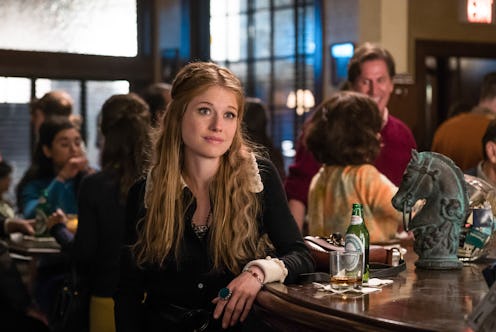
You know that saying “well-behaved women rarely make history?” I think the cast and crew of Good Girls Revolt must have had that written on the walls of their trailers when filming, because there is a whole lot of girl power on that show, and it’s not from keeping the status quo. When researcher Patti Robinson and her colleagues realize that they’re never going to get their own byline at News of the Week, they decide to take matters into their own hands and, well, revolt. But is Patti Robinson on Good Girls Revolt based on a real person?
Well, Good Girls Revolt is based on Lynn Povich’s book of nearly the same name, which documents the 1970 lawsuit waged against Newsweek magazine for gender discrimination. Povich and 45 other women sued the magazine claiming they essentially weren’t allowed to write anything that would be published in the magazine. They were hired as researchers and teamed up with a man — a journalist — who would take the information that their researcher gave them, smack his name on an article version of it, and send it in for publication. The women were doing a lot of the work and getting none of the acclaim, and they decided to take the magazine to court over it. According to an interview Povich did with The Daily Beast, the women in the lawsuit actually had to sue twice to get the job done, and Povich wasn’t made a senior editor until 1975, about five years after all of this had started.
Bustle reached out to Newsweek for comment on the original lawsuit and the show portraying it now, but has not yet heard back. The lawsuit resulted in a settlement in which Newsweek agreed to provide equal employment opportunities to women.
The only woman on Good Girls Revolt that was an actual real-life person in the newsroom is Nora Ephron, played by Grace Gummer. Ephron didn’t stick around too long at Newsweek, instead moving about to further her career. She actually wasn’t even there during the time of the lawsuit — Ephron only worked at the magazine from 1962 to 1963 as a mail girl, according to Newsweek. Leaving was a good choice for Ephron — she eventually became a world-famous journalist and screenwriter, and the world would probably not have When Harry Met Sally had it not been for her leaving Newsweek.
The character of Patti Robinson, on the other hand, is fictional. I am sure that the idea for Patti was conjured up through many of the 46 women who sued Newsweek, but as far as I can tell, Patti Robinson is a figment of the writers' imaginations. While disappointing to me that the fun-loving, hippie-chic, whip-smart researcher isn’t a real person, this isn’t necessarily a bad thing — I like when a show can combine the real people and happenings of the times with fictional characters. Mad Men, obviously, was the best at this, and Good Girls Revolt has drawn a lot of comparisons to Mad Men, especially due to the time period and setting.
Star Erin Darke explained to Bustle's Caitlin Gallagher why Good Girls Revolt chose not to use the real people involved in the suit, and the show's reasoning makes total sense. "All of our characters are sort of inspired by, and amalgamations of sort of several of the women in the actual lawsuit," Darke says. "It gives us, the show, a lot more license in dramatic storytelling ... [and] when you are portraying one specific person from history, you have such a responsibility to represent them accurately." She continues, "I hope that the way we're doing it, this way the women who actually lived through this, like these actual women of the Newsweek lawsuit, can watch the show and be like, 'Yes, that is the spirit of what we did, but I don't have to feel uncomfortable in knowing that you are me.'"
It’s not easy to combine fact and fiction, but think of the possibilities of whom and what Good Girls Revolt could cover if it goes on. Gloria Steinem could appear! A fictionalized Povich! Shirley Chisolm! The possibilities are endless. People often tend to forget that history repeats itself, so if our entertainment is reminding us of important feminist events and people in the past, that’s a good thing.
Image: Amazon Studios